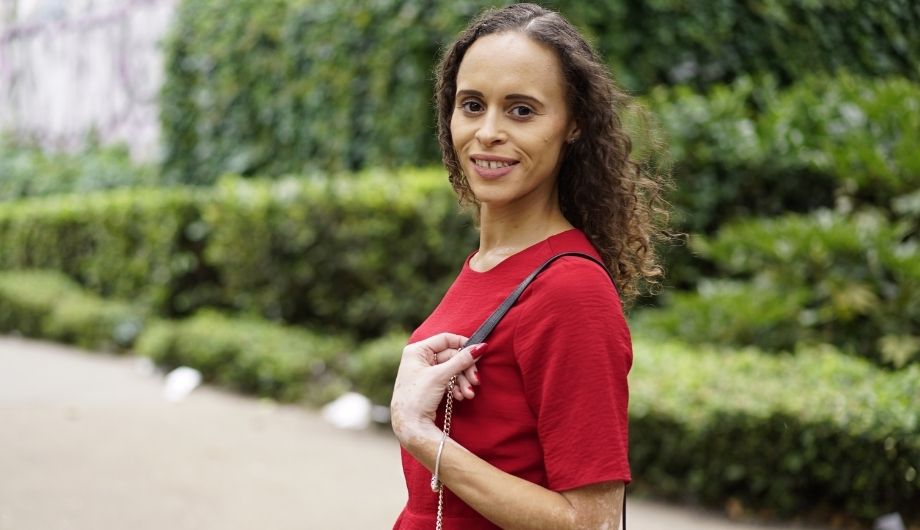Back on the 10 March 2020, before the first COVID-19 lockdown, our ambassador, Natalie, joined the All Party Parliamentary Group on Skin (APPGS) to talk about her experiences of growing up with vitiligo.
Natalie shared how her life had been impacted, from not wanting to do everyday activities like PE or joining her friends at the swimming pool, to feeling nervous heading into job interviews in case she was asked about her skin.
The APPGS was gathering first-hand accounts from people with skin conditions, along with evidence from clinicians, healthcare professionals, academics and charities like Changing Faces for their report, Mental Health and Skin Disease.
Some MPs that spoke shared their own personal experiences with a skin condition or made reference to patients they knew who had been impacted, and they did so with a genuine passion to encourage change.
The report was published in September 2020 and highlighted the dire lack of NHS mental health provision available for anyone with a skin condition in the UK today. The report made recommendations for Government around improving the availability of services across the UK. It also called for better training for healthcare professionals to improve understanding that people with skin conditions may also require mental health support as part of their treatment.
There was a particular focus on the need for services for children, and we backed wholeheartedly the recommendation that all children and young people experiencing mental health distress associated with their skin condition must have access to appropriate mental health support. You can read our full response to the report here.
Last week, Sir Edward Leigh MP, the chair of the APPGS secured a Westminster Hall Debate on skin conditions, mental health and the NHS, with the Minister for Care and Mental Health, Gillian Keegan MP.
Our ambassador Natalie was watching the debate live on Parliament TV, and has shared her thoughts on what happened:
“It was a really great debate and interesting to hear the viewpoints of the MP’s contributing. I really liked how Sir Edward Leigh reiterated the importance of investing in support services for those with a visible difference and explaining how the mind and skin are linked. There were so many strong points raised.
“By sharing statistics from the report and Changing Faces’ research it was clear to the Minister the scale of the problem, the numbers are quite startling. They also showed how much Covid has psychologically impacted those with a visible difference.
“Hearing the debate felt like a positive step forward. It felt like the many issues and challenges experienced by those with a visible difference, particularly skin conditions, were finally being taken seriously. This was a great opportunity to raise awareness and educate those who often misunderstand people like me.

Natalie shared her experiences of growing up with vitiligo with All Party Parliamentary Group on Skin.
“The debate gave particular focus to young people with skin conditions and the pressures they are facing. We heard a heart-breaking statistic about those who have contemplated suicide. It’s for reasons like this (and many, many others), that more funding has to be directed towards creating and improving support services.
“I found it disappointing to find out that there are no dedicated psychodermatology clinics in Wales, and it’s a postcode lottery for England too. That shouldn’t be the case in 2022!
“Each MP that spoke did a great job in supporting and voicing the importance of improving and investing in mental health services within the NHS, providing holistic support for patients, making sure health professionals are knowledgeable and having patient assessments that treat the mind and skin together.
“Some MPs that spoke shared their own personal experiences with a skin condition or made reference to patients they knew who had been impacted, and they did so with a genuine passion to encourage change.
“I felt very proud to hear Carolyn Harris MP and Caroline Nokes MP both speak out about the support services Changing Faces provides, and the need for these services to be considered as part of the solution to the problem. Carolyn encouraged the Minister to follow in the footsteps of the Welsh Government and sign up to Pledge To Be Seen.
“She rightly flagged that as well as providing mental health support, there also needs to be action taken to reduce the intolerance and prejudice faced by people with visible differences, and having better representation in popular culture, job adverts and public information campaigns is part of that.
“I’m pleased I shared my story with the APPGS back in March 2020, I feel like I played a part in getting these issues in front of the Minister and debated. Now I’m looking forward to hearing what the Minister is going to do next. The sooner we see better services in place, the more supported and confident those with a visible difference will feel.”
Since the debate, we’ve contacted the Minister, sharing more information and requesting a meeting so we can make sure Changing Faces is part of the conversation to create better services and support for those with skin conditions, and visible differences.